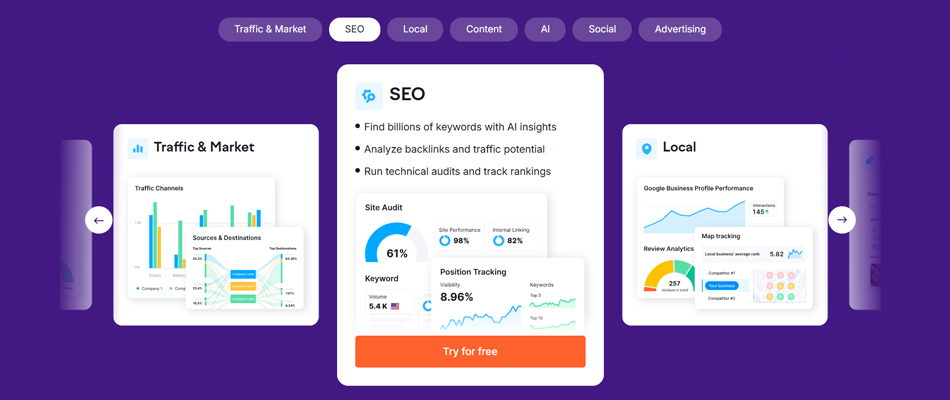Work Hours
Monday to Friday: 9AM - 6PM
Weekend: Closed

In the competitive world of digital marketing, ensuring your content stands out is key to achieving higher rankings. Yet, a common issue that often goes unnoticed is keyword cannibalization -a challenge that can silently sabotage your SEO efforts. Whether you’re a seasoned marketer or just starting your journey, understanding the impact of targeting the same keywords across multiple pages is critical for optimizing your site’s performance.
This guide provides actionable insights to identify, fix, and prevent keyword cannibalization, ensuring your pages work together rather than compete against each other. Keep reading to explore practical solutions, backed by tools and examples, and create a keyword strategy that drives consistent traffic and improves your rankings.
How to Identify Keyword Cannibalization on Your Website?
Identifying keyword cannibalization is the first step in maintaining strong search engine rankings. Here are three effective methods to diagnose the issue:
1. Using Tools like SEMrush or Ahrefs

When tackling keyword cannibalization, leveraging tools like SEMrush or Ahrefs can be a game changer. These platforms provide in-depth insights into your website’s keyword performance and structure.
With SEMrush, you can easily conduct a domain analysis that reveals how multiple pages might compete for the same keywords. The tool offers reports highlighting which phrases are triggering traffic to several URLs.
Ahrefs takes it a notch higher by offering detailed backlink profiles alongside keyword data. This helps identify if different pages are inadvertently vying for the same search engine ranking due to overlapping content.
Both tools allow you to spot duplicate or similar keywords used across your site effectively. By analyzing this data, it’s easier to address potential pitfalls before they affect your site’s visibility on search engines.
For example, a quick SEMrush domain analysis might reveal two blog pages competing for “best digital marketing tools” leading to diluted authority.
2. Manual Analysis of Website Content and Keywords Used
Conducting a manual analysis of your website content is essential for identifying keyword cannibalization. Start by reviewing each page carefully, focusing on the keywords used throughout.
Look for instances where multiple pages target the same or similar phrases. This overlap can dilute your search engine ranking and confuse both users and search engines alike.
Take note of page titles, meta descriptions, and headings. These are critical areas where keyword usage should be unique to avoid competition among your own content.
Next, examine how these keywords fit within the context of the content. If two articles cover nearly identical topics with overlapping keywords, it’s time to rethink their focus.
By doing this detailed examination regularly, you can ensure that each piece serves its purpose without stepping on another’s toes in terms of SEO performance.
Pro Tip: Perform a Google search using “site:yourdomain.com [keyword]” to identify competing pages.
3. Checking for Duplicate or Similar Pages
Conducting a manual analysis of your website content is essential for identifying keyword cannibalization. Start by reviewing each page carefully, focusing on the keywords used throughout.
Look for instances where multiple pages target the same or similar phrases. This overlap can dilute your search engine ranking and confuse both users and search engines alike.
Take note of page titles, meta descriptions, and headings. These are critical areas where keyword usage should be unique to avoid competition among your own content.
Next, examine how these keywords fit within the context of the content. If two articles cover nearly identical topics with overlapping keywords, it’s time to rethink their focus.
By doing this detailed examination regularly, you can ensure that each piece serves its purpose without stepping on another’s toes in terms of SEO performance.
Example: Two product pages targeting “best SEO services” may need consolidation or re-optimization for unique angles.
How to Avoid and Fix Keyword Cannibalization

1. Consolidating Duplicate Pages
Consolidating duplicate pages is a crucial step in tackling keyword cannibalization. When multiple pages target the same keywords, they dilute your website’s authority. This fragmentation can confuse search engines and lead to lower rankings.
Start by identifying pages with overlapping content. Use tools like SEMrush or Ahrefs for an efficient audit. Once you’ve pinpointed these duplicates, it’s time to merge them into one comprehensive resource.
Create a single page that combines all relevant information from the duplicates. Ensure it provides value and answers user queries effectively. Optimize this new page for your targeted keywords, focusing on unique angles or insights.
Don’t forget to set up 301 redirects from the old URLs to the consolidated one. This preserves any existing traffic while signaling search engines about the changes you’ve made, ultimately boosting your site’s performance in search results.
2. Setting Up a Clear Keyword Targeting Hierarchy
Establishing a clear keyword targeting hierarchy is essential for effective SEO. Start by categorizing your keywords based on their intent and relevance to your content. Group them into primary, secondary, and long-tail keywords.
Primary keywords should directly relate to your main topic and attract the highest search volume. These are the cornerstones of your content strategy. Secondary keywords can support the primary ones while addressing related themes or subtopics.
Long-tail keywords provide specific phrases that target niche audiences. They often have lower competition but higher conversion rates.
Create a map that outlines how each piece of content fits within this hierarchy. This ensures clarity in focus, helping avoid overlaps that lead to keyword cannibalization. A well-structured approach allows you to cover multiple angles without diluting the impact of any single page on search engine rankings.
3. Updating and Optimizing Content to Be More Specific and Unique
Updating and optimizing content to be more specific and unique is a vital step in mitigating the effects of keyword cannibalization. Start by revisiting existing pages that may have overlapping topics or keywords. Analyze each page’s purpose and ensure that it serves a distinct function within your site’s structure.
When updating, delve into providing comprehensive information on niche aspects of the topic at hand. This will not only enhance user experience but also help search engines understand exactly what each page aims to convey. Use detailed headings, bullet points, and engaging visuals to enrich your content.
Incorporate relevant keywords naturally while avoiding keyword stuffing—a practice that can lead to penalties from search engines. Instead, focus on creating valuable content for your audience that aligns with their search intentions.
As you refine your web pages, establish clear distinctions between similar subjects. Consider merging related articles where appropriate or directing users through internal linking strategies to guide them toward the most relevant resources.
By prioritizing specificity and uniqueness in your website’s content strategy, you’ll significantly reduce the risks associated with keyword cannibalization. Doing so not only enhances search engine ranking potential but also elevates overall website performance—ultimately leading to higher traffic levels and improved user engagement across all channels
Updated Example: Instead of two blogs covering “SEO tips” revise one to target “advanced SEO strategies” while the other focuses on “SEO tips for small businesses.”
Conclusion
Keyword cannibalization can significantly affect your website’s SEO success by dividing keyword authority and confusing search engines. However, with the right tools, targeted analysis, and strategic updates, you can address this issue effectively.
At Segnant, we specialize in crafting SEO strategies that optimize your content and reclaim lost rankings. Explore our expert SEO services or contact us for a free consultation today to elevate your online presence and maximize traffic.

